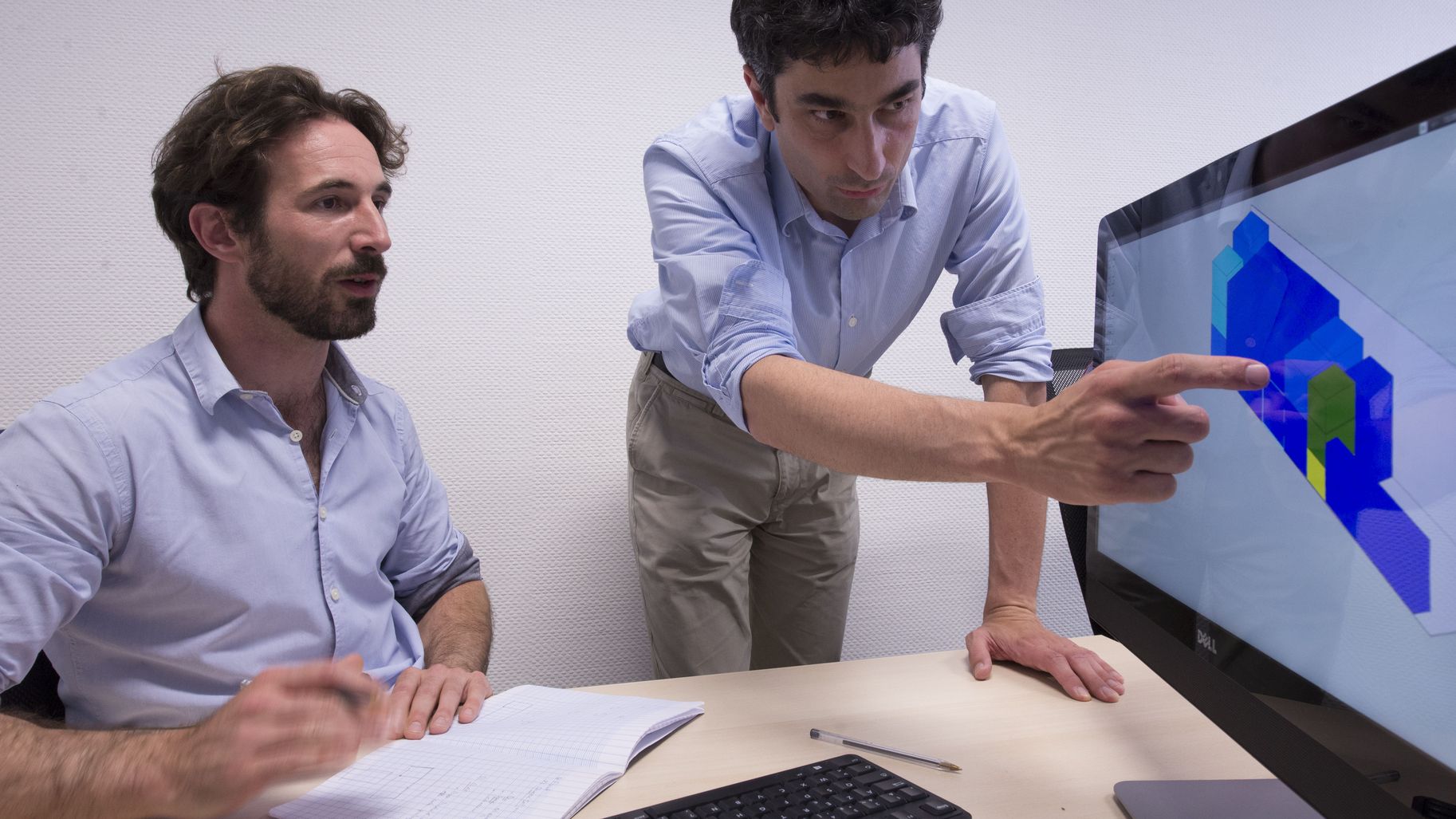The RealOpt project team - researching algorithms to help ensure companies make the right decisions
Date:
Changed on 12/12/2019

A joint undertaking involving the University of Bordeaux, the CNRS and Bordeaux INP (a public body bringing together eight engineering schools in the Nouvelle-Aquitaine region), RealOpt is now home to fifteen or so individuals: eight permanent researchers and occasional support from PhD students and postdoc researchers, all of whom are just as comfortable with mathematical models as they are with algorithmic tools. “It’s in our DNA”, explains François Clautiaux, the new man in charge of the team. “We provide a mix of mathematics and IT. We also act as a bridge between basic research - pure science - and the corporate world.”
RealOpt practise combinatory optimisation, a branch of mathematics where the aim is to optimise the different parameters for a given situation in order to determine the best possible solution. François Clautiaux explains this in more detail: “The choices made by a company are often dictated by a cost - whether financial, legal, social or environmental, such as the rate of CO2 emissions or the quality of service, a measure of satisfaction - that they are keen either to minimise or maximise.
What we want to do is to design an IT program that will enable companies to make the best possible choices.
This provides them with quality solutions, all within a reasonable processing time: there’s no chance of the program taking weeks to deliver a response! ”
The team are regularly sought out by manufacturers and SMEs, often for issues relating to vehicle rounds, one of the biggest challenges currently facing optimisation. Indeed, RealOpt are currently achieving some of the best results in this field at a global level. At this moment in time, researchers are working with EDF on programming maintenance stoppages for nuclear power plants and with the SNCF on managing TER (regional railway) lines.
From pen and paper to the computer and from mathematics and algorithms to IT development, there are a number of different steps to modelling. The first involves identifying the decision-making levers specific to each company, their constraints and, as a consequence, their costs. Then comes the process of designing bespoke algorithms. The team’s tool of choice is integer linear programming, which enables them to tackle a high degree of complexity with a significantly reduced margin of error.
One of the biggest challenges is finding a way of identifying variables, the external factors that are subject to change. This might be the number of passengers, energy consumption, the development scenario for renewable energy, maximum differences in temperature, etc. “Being able to adapt to changing environments is one of the biggest challenges currently facing optimisation”, stresses François Clautiaux. “This means finding reliable solutions that are resistant to vagaries, i.e. capable of taking uncertainties and variations in parameters into account when making decisions.”
The Bordeaux-based team play an active role in the vibrant combinatory optimisation community: a sector known for being highly competitive, but which also promotes the sharing of knowledge. The major date on the diary for researchers in the field of mathematical optimisation, ISMP , is a three-yearly international conference that brings together more than 2,000 international experts. The 2018 edition was organised by RealOpt in Bordeaux. “This type of event gives us the opportunity to meet each other, to discover new ideas, to recruit and to set up exchanges, with one of our researchers getting the chance to go to Rio to work on problems relating to delivery rounds.” François Clautiaux was also co-organiser (1) of the second Journée Aquitaine “AI, OR and data science”, held on 7th February: 300 participants from companies operating in the digital sphere and regional research laboratories came to Talence to discuss optimisation, artificial intelligence and machine learning.
(1) With the ROADEF (Société de Recherche Opérationnelle et d'Aide à la Décision Française - the French Society for Operational Research and Decision Support), l'AMIES (Agence pour les Mathématiques en Interaction avec l'Entreprise et la Société - the French Agency for Mathematics in Interaction with Business and Society), Kedge Business School , Bordeaux Data Science and The Data Factory .

François Clautiaux, from Compiègne to Bordeaux
François Clautiaux completed his PhD at the University of Technology of Compiègne and a postdoctorate at the University of Braga (Portugal) before becoming a lecturer at the University of Lille and the Lille Fundamental Computer Science Laboratory, in addition to becoming a member of the Inria team Dolphin. In 2013, he joined the University of Bordeaux as a professor within the Bordeaux Mathematical Institute (IMB - Institut de Mathématiques de Bordeaux) and a member of RealOpt, appointed as head of the team in late 2018. He is also secretary of the French Society for Operational Research and Decision Support (ROADEF).